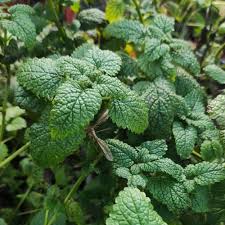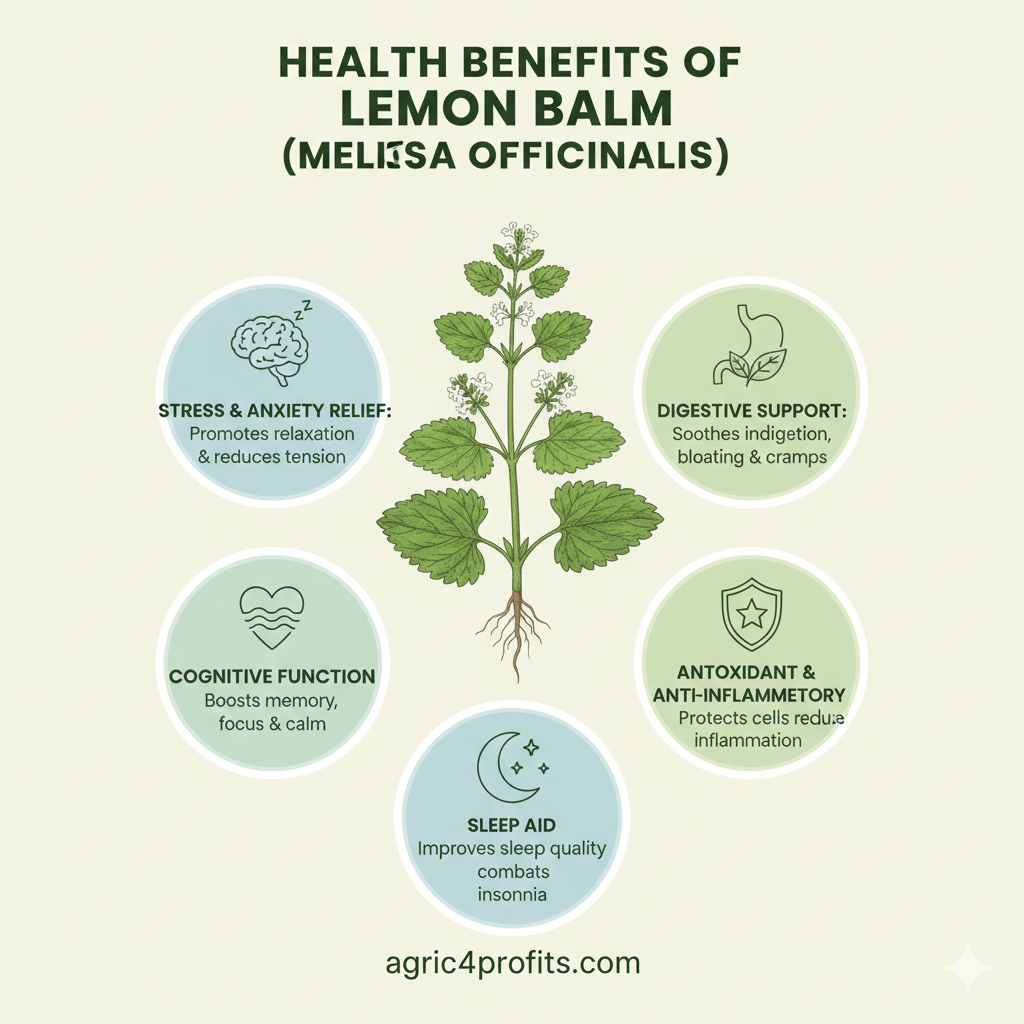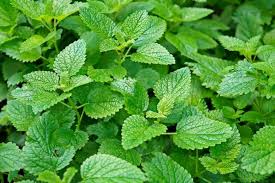Lemon balm plant is a member of the mint perennial family. Common balm or balm mint are other names for the plant, which is scientifically known as Melissa officinalis.
Its natural habitat is the southern regions of Europe, as well as other regions of the Middle East and Central Asia, but it is now routinely grown in the Americas and other areas of the world.
Different lemon balm benefits have been used in traditional medicine, particularly in European nations like Austria. In reality, the 14th-century alcoholic extract beverage Carmelite water, which is still sold in Germany, contains lemon balm.
The natural health cures that have been around the longest can sometimes be the ones that are the most effective. That is unquestionably the case with lemon balm, a fast-growing herb whose benefits on anything from cancer to sleeplessness have been researched.
What uses does the herb lemon balm have? Since the Middle Ages, Melissa has been recommended by physicians as a natural remedy to enhance sleep, lessen anxiety, heal wounds, and lengthen life. Melissa is used in teas, cooking, and the production of Melissa essential oil.
Since the plant originated in Europe and the Middle East, many studies have been done on its advantages today.
You’ll want to grow some lemon balm in your own garden once you learn all the ways it can benefit you, as I’ve listed below.
Read Also: 8 Health Benefits of Boldo (Peumus boldus)
7 Health Benefits of Lemon Balm (Melissa officinalis)

1. Protects Against Heart and Liver Problems
According to studies, lemon balm essential oil can help lower elevated triglycerides and enhance the liver’s ability to synthesize cholesterol, which may help protect the heart and liver.
Inhaling lemon balm oil lowers several of the components that contribute to the common liver cancer cell’s unceasing growth, according to the same 2012 study that produced these findings.
Lemon balm may also provide heart-health benefits by preventing damage to the heart muscles. In a 2016 study, scientists administered an oral extract of the plant to animals and discovered that it decreased blood pressure and heart rate. They also discovered signs of resistance to heart injury at lower doses.
2. Antibacterial
There is some proof that lemon balm products, such as kombucha (a probiotic-rich fermented beverage), have antibacterial properties that may naturally combat pathogenic microorganisms.
Particularly against candida, lemon balm oil exhibits strong antibacterial and antimicrobial activity. A number of candida symptoms, such as tiredness, cognitive fog, digestive issues, and a compromised immune system, are brought on by this typical yeast infection.
3. Fights Against Diabetes
Researchers have examined the impact of lemon balm essential oil and extract on blood sugar levels. By lowering blood sugar levels and diabetes-related oxidative stress, both provide comparable benefits.
In fact, Free University of Berlin researchers were so convinced by the strong evidence that they concluded that “ethanolic lemon balm extract can potentially be utilized to prevent or concurrently treat type 2 diabetes.”
Does lemon balm help people lose weight? It may be helpful for keeping a healthy weight since it has anti-inflammatory effects, can help you deal with stress, helps digestion, and promotes metabolic health. Although it is not a miracle cure, assistance with weight loss may be a possible side effect.
Read Also: 6 Health Benefits of Juniper Berries
4. Improves Sleep And Combats Anxiety
Herbal remedies made from lemon balm have historically been used to treat sleeplessness and anxiety. One of its well-known qualities is a slight sedative effect.
These assertions appear to be supported by scientific evidence and go beyond the treatment of general anxiety. For instance, there is some evidence that this herb helps reduce impulsivity, hyperactivity, and concentration issues in elementary school students.
It also appeared to improve mood and/or cognitive performance when consumed internally in food products, as shown by a study including young adults.
According to the available studies, it may enhance math abilities, concentration, and alertness. For instance, there is some evidence that this herb helps reduce impulsivity, hyperactivity, and concentration issues in elementary school students.
It also appeared to improve mood and/or cognitive performance when consumed internally in food products, as shown by a study including young adults.
According to the available studies, it may enhance math abilities, concentration, and alertness. Does lemon balm give you the jitters? It might, despite the fact that it functions differently from sedative drugs.
It appears to lessen insomnia symptoms and sleep disturbances when used as a herbal sleep aid, even during the menopause when symptoms like anxiety, hot flashes, and restlessness are particularly common.
5. Helps To Prevent Herpes
Due in part to its antiviral properties, lemon balm uses also includes topical applications. It is a helpful herbal medicine to treat the herpes virus specifically when administered topically to the skin.
Although there is no permanent treatment for herpes, there are techniques to shorten the length and frequency of outbreaks. The majority of studies on lemon balm’s effectiveness for treating herpes labialis, or cold sores, have been done to date.
According to a study, applying lemon balm extract as a lotion lengthens the time between herpes outbreaks, speeds up the healing process, and seems to lessen symptoms like burning and itching.
Interestingly, studies show no risk of the herpes virus developing resistance after repeated applications due to the method lemon balm acts to achieve this.
When lemon balm essential oil is used, the same outcomes appear to be obtained. It appears that lemon balm’s anti-herpes simplex virus properties are related to its antioxidant components, according to a number of publications. These include polyphenols and tannins. There are no known negative consequences from applying or ingesting this chemical.
Read Also: 7 Health Benefits of Chamomile (Camomile)
6. Anti-inflammatory And Antioxidants
This herb can combat free radical damage in ways that could be ground-breaking for natural medicine. The possible effect of lemon balm against glioblastoma multiforme, a particular type of cancer, may be especially notable in this advantage. It usually starts in the brain, and there are no known effective treatments for this quickly spreading malignancy.
However, a 2014 study discovered that multidrug resistance associated protein 1 expression was inhibited, and apoptosis (spontaneous cell death) was brought on in these cancer cells (MRP1).
Given that MRP1 contributes to the drug resistance that tumors develop to conventional treatments like chemotherapy, this is very significant.
The most prevalent liver cancer cell, MCF-7 (a breast cancer cell line), a colorectal cancer cell line, a type of cancer affecting the organ lining separating the organ from the rest of the body, and two different types of leukemia cells are among the cancer cell lines that have shown apoptotic effects when exposed to lemon balm products in other studies.
In one investigation on how the antioxidants in lemon balm influence oxidative stress brought on by modest amounts of radiation, lemon balm showed remarkable outcomes, including a notable rise in blood levels of other cells.
7. Can Regulate Active Thyroid
More than 12% of Americans suffer from thyroid disorders, and one of the two most prevalent thyroid illnesses, hyperthyroidism, can be helped by a lemon balm.
When attempting to control an overactive thyroid, natural health practitioners frequently utilize lemon balm extract as one of their therapy options.
According to research, these extracts, especially in those with Grave’s disease, prevent substances from attaching to the thyroid receptor that causes the thyroid to overactive.
Read Also: 8 Health Benefits of Comfrey (Symphytum officinale)
Nutritional value of Lemon Balm (Melissa officinalis)

1. Rosmarinic acid: Lemon balm is rich in rosmarinic acid, a potent phenolic compound that provides strong antioxidant and anti-inflammatory effects, helping protect cells from damage.
This key phytochemical supports the herb’s traditional uses for calming and immune health.
2. Flavonoids (quercetin, rutin, kaempferol): Contains various flavonoids that act as antioxidants, supporting cellular protection and reducing oxidative stress.
They contribute to the plant’s anti-aging and anti-inflammatory benefits.
3. Essential oils (citronellal, citral, geraniol, linalool): The volatile oils include citronellal and citral, offering antimicrobial and calming properties while providing the characteristic lemon scent.
These compounds enhance digestive and respiratory support.
4. Caffeic acid: A phenolic acid present that boosts antioxidant activity and aids in reducing inflammation.
It works synergistically with other compounds for overall protective effects.
5. Triterpenes (ursolic acid, oleanolic acid): These triterpenes provide anti-inflammatory and antimicrobial benefits, supporting metabolic and skin health.
They add to the herb’s broad therapeutic profile.
6. Polyphenols: High levels of polyphenols contribute to potent free radical scavenging and support immune function.
They are a major source of the plant’s antioxidant capacity.
7. Tannins: Astringent tannins help with digestive comfort and provide additional antioxidant support.
They aid in traditional uses for gut soothing.
8. Minerals (potassium, calcium, sodium, lithium): Supplies essential minerals like potassium for heart function and calcium for bone health, with trace amounts of others.
These contribute to basic nutritional support in herbal preparations.
9. Vitamins (implied through antioxidant support): While not always quantified, the herb supports vitamin-like antioxidant effects comparable to or stronger than some B and C vitamins in studies.
This enhances its role as a supportive herb.
10. Carbohydrates and proteins (in dried form): Dried leaves contain notable carbohydrates and some protein content, providing minor energy and structural support.
They add to the overall nutritional profile when consumed as tea or supplement.
Scientific Evidence and Case Studies on Lemon Balm (Melissa officinalis)

1. Antioxidant and oxidative stress reduction: Studies show lemon balm extracts improve oxidative stress and DNA damage, particularly in populations exposed to radiation, due to high phenolic content like rosmarinic acid.
2. Anti-anxiety and mood enhancement: Clinical trials demonstrate lemon balm reduces mild-to-moderate anxiety and improves mood, often through modulation of neurotransmitters like GABA.
3. Sleep quality improvement: Research indicates better sleep in participants with disturbances, linked to calming compounds such as linalool and citronellal.
4. Cognitive function support: Supplementation enhances memory and cognitive performance, especially in older adults, via neuroprotective effects.
5. Antiviral activity against HSV: Topical and oral applications reduce herpes simplex virus symptoms, with rosmarinic and caffeic acids inhibiting viral attachment and penetration.
6. Hypolipidemic effects: Meta-analysis of randomized trials shows reductions in total cholesterol, triglycerides, and LDL levels, supporting cardiovascular benefits.
7. Anti-depressant effects: Systematic reviews and meta-analyses confirm slight but significant improvements in depression symptoms without major side effects.
8. Anti-inflammatory and skin benefits: Extracts protect skin cells, promote collagen, and reduce inflammation, with potential anti-wrinkle effects via increased Endo180 production.
Summary of Lemon Balm (Melissa officinalis)
| Aspect | Details |
|---|---|
| Plant Description | Perennial herb in Lamiaceae family, native to eastern Mediterranean, Southern Europe, Western Asia; bushy growth 12-24 inches, lemon-scented wrinkled leaves, white-yellow flowers. |
| Traditional Uses | Calming for stress/anxiety, digestive aid for indigestion/bloating, sleep support, mood enhancement, headache relief, respiratory soothing, menstrual symptom relief. |
| Key Phytochemicals | Rosmarinic acid, caffeic acid, flavonoids (quercetin, rutin), essential oils (citronellal, citral, geraniol, linalool), triterpenes (ursolic/oleanolic acids), tannins, polyphenols. |
| Health Benefits Listed | Digestive aid, calming nervous system, sleep improvement, antioxidant defense, cognitive support, anti-inflammatory, immune boost, respiratory health, skin enhancement, headache relief, antiviral (HSV), blood sugar regulation, mood enhancement, menstrual relief, potential anticancer (15 benefits detailed). |
| Preparation Methods | Teas/infusions, culinary addition, aromatherapy, topical oils, supplements (capsules/tinctures), baths, herbal blends. |
| Safety Notes | Generally safe in moderation; possible allergies (mint family), photosensitivity, GI discomfort, drowsiness; avoid excessive use; consult for pregnancy, breastfeeding, medications (sedatives, thyroid); dilute essential oil. |
Frequently Asked Questions About Lemon Balm (Melissa officinalis)
1. What is lemon balm primarily used for?
It is traditionally used for reducing stress, anxiety, improving sleep, soothing digestion, and enhancing mood.
2. How do I make lemon balm tea?
Steep 1-2 teaspoons of fresh or dried leaves in hot water for 5-10 minutes; strain and drink 1-3 times daily.
3. Is lemon balm safe during pregnancy?
Consult a healthcare provider before use, as safety data is limited; generally advised to avoid or use cautiously.
4. Can lemon balm help with anxiety or sleep issues?
Yes, studies suggest it reduces mild anxiety and improves sleep quality due to its calming compounds.
5. What are common side effects of lemon balm?
Possible mild GI upset, drowsiness, allergic reactions, or skin irritation from topical use; rare in moderate amounts.
6. Does lemon balm interact with medications?
It may interact with sedatives, thyroid drugs, or other CNS depressants; consult a doctor if on medication.
7. Can lemon balm be used topically for skin?
Yes, diluted essential oil or extracts support skin health, reduce aging signs, and may help with conditions like herpes.
8. How should I store dried lemon balm?
Keep in an airtight container in a cool, dark place to maintain potency and aroma.
9. Is lemon balm suitable for children?
Use with caution and only after consulting a pediatrician; avoid in young children due to limited data.
10. Where does lemon balm grow best?
It thrives in well-drained, slightly acidic to neutral soil with partial shade; adaptable to temperate climates and easy to cultivate in gardens.
Do you have any questions, suggestions, or contributions? If so, please feel free to use the comment box below to share your thoughts. We also encourage you to kindly share this information with others who might benefit from it. Since we can’t reach everyone at once, we truly appreciate your help in spreading the word. Thank you very much for your support and for sharing!
Disclaimer: This article is for educational and informational purposes only. The health benefits described are based on scientific research and traditional knowledge. They ayre not a substitute for professional medical advice, diagnosis, or treatment. Always consult a healthcare professional before using any herb or natural remedy for medical purposes.
Read Also: Waste To Fertilizer: What You Need to Know

